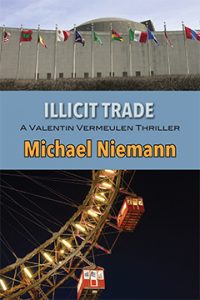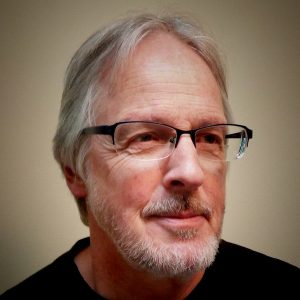I am delighted to have fellow International Thriller Writer Michael Niemann on my blog today! His latest thriller ILLICIT TRADE (Coffeetown Press, Feb 1, 2017) was recently released, and today he answers the question, “Where do you get your ideas?”
THE WORLD AS INSPIRATION
By Michael Niemann
Where do you get your ideas? That’s a perennial question, authors of crime fiction face. And the answer is different for every one of us. So let me tell you the story of how I get my ideas.
For the past thirty years, I’ve had the following conversation innumerable times.
Person at a party: “What do you do?”
Me: “I teach.”
“What do you teach?”
“World Politics.”
“Oh, that must be really interesting right now.”
All these years, I have puzzled over this response because I knew there hadn’t been any increase or decline of the level of interestingness of world politics for as long as I’ve been teaching it. Since I started writing fiction, I think I’ve found an answer.
In his book on detective fiction, French sociologist Luc Boltanski points out that in modern western societies reality is represented as robust and predictable. We generally believe in the reality of reality. Everyday life would become impossible if we didn’t. At the same time, we can’t help but have anxieties about the reality of reality. Our governments claim to have things under control but all of us have had experiences that make us less sure about that claim. That anxiety is even more prevalent when it comes to world politics. The world is so patently messy and complicated. How can one not be anxious about it? The answer “Oh, that must be really interesting right now” reflects this unease.
But this anxiety also insures a continued readership for crime fiction fiction. Because, as Boltanski points out, “the particular sort of excitement called suspense, originates in the possibility of calling into question the reality of reality.” Crime fiction channels an already existing anxiety into something more enjoyable we call suspense.
Which brings me to my genre, international crime fiction. It dates back to 1648 when Giovanni Paolo Marana wrote Letters Writ By A Turkish Spy. Since then all kinds of sub-genres have emerged in response to the changing dynamics of world politics. Childers’ Riddle of the Sands anticipated World War I. Buchan’s Thirty Nine Steps took place during that war. Graham Green anticipated World War II in The Confidential Agent. The Cold War brought us George Smiley and James Bond. The post Cold War era terrorism, global crime networks and corporate malfeasance emerged as topics of choice. My protagonist Valentin Vermeulen is firmly part of the post Cold War world. He works as an investigator for the United Nations, an international organization whose tasks have grown dramatically since the early 1990s.
When looking for a new plot, I don’t have to do a lot of searching. Given Vermeulen’s job, I can send him all over the world wherever the UN is active. And that world is full of possible stories. The Office of Internal Oversight Services for which he works is an actual entity. I can read the annual reports for plot ideas.
But, as all crime writers know, I have to navigate that fine balance between plausibility and suspense. The plot has to connect to that anxiety I mentioned above. It must be in the realm of the possible. That’s the easy part. I find lots of incidents that did actually happen, like the visa fraud at the beginning of Illicit Trade. That really did happen. But by itself that’s not a terribly exiting story. Most fraudulent behavior of real humans is rather pedestrian. And we don’t want our readers to say, “Meh.”
So my job is to take something that actually happened and link that to something else that also happened. And do it in such a way as to turn a reader’s low level anxiety about the world into a suspenseful story that could have happened but fortunately didn’t.
And that’s a lot of fun.
 ILLICIT TRADE by Michael Niemann
ILLICIT TRADE by Michael Niemann
Two poor Kenyan men visiting the U.S. are found dead, one in jail, one on the street. Both used forged UN documents to enter the country. Valentin Vermeulen’s superiors have no interest in the plight of undocumented immigrants, but they want him to stop the fraud. The clues take Vermeulen from New York City to Newark, where he riles a woman known as “The Broker,” then to Vienna.
Earle Jackson, a small-time hustler and the last person to speak with one of the dead Kenyans, has taken the man’s passport and money. He also finds a note listing an address in Newark, where his efforts to cash in on the situation go awry. Fleeing for his life, Jackson flies to Nairobi using the dead man’s passport.
Vermeulen and Jackson have chanced upon a criminal network more extensive and vicious than either could have imagined. To survive, Vermeulen must do more than sever a few links. He must find the mastermind at the top.
 Michael Niemann grew up in a small town in Germany, ten kilometers from the Dutch border. Crossing that border often at a young age sparked in him a curiosity about the larger world. He studied political science at the Rheinische Friedrich-Wilhelms Universität in Bonn and international studies at the University of Denver. During his academic career he focused his work on southern Africa and frequently spent time in the region. After taking a fiction writing course from his friend, the late Fred Pfeil, he switched to mysteries as a different way to write about the world.
Michael Niemann grew up in a small town in Germany, ten kilometers from the Dutch border. Crossing that border often at a young age sparked in him a curiosity about the larger world. He studied political science at the Rheinische Friedrich-Wilhelms Universität in Bonn and international studies at the University of Denver. During his academic career he focused his work on southern Africa and frequently spent time in the region. After taking a fiction writing course from his friend, the late Fred Pfeil, he switched to mysteries as a different way to write about the world.





